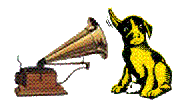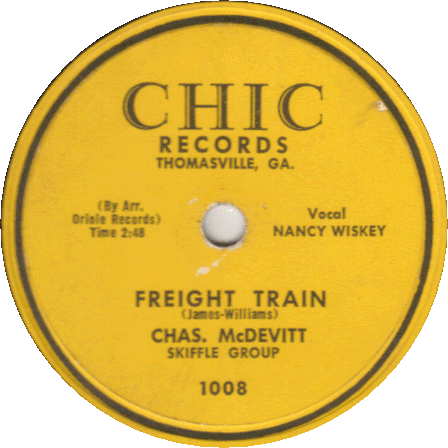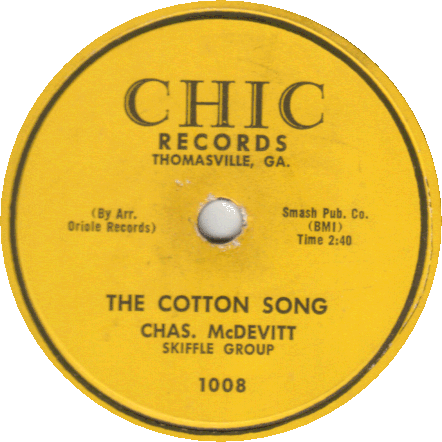
The Beatles
at 78 RPM
|
Cool 78 of the Month August 2006 |
|
Chas McDevitt Skiffle Group (featuring Nancy Whiskey on Vocals) Freight Train Chic 1008 (USA) 1957 |

|
|
Continuing our look at skiffle we turn to a recording that by group that embodied the home-grown sound of skiffle with the accomplished skill of highly polished and professional musicians. This recording also brought money into the coffers of the small Chic label of Thomasville Georgia, pain to US immigration officials, and a meeting with a man who in the 60s would bring the Beatles to the TV sets of the USA. Chas McDevitt began playing banjo in the early 1950s. Knocking around Surrey in the UK, Chas had a keen interest in jazz and blues and other musical styles of the southern United States. He eventually ended up in a Dixieland band, High Curley Stompers. It was here, among the sound of Dixieland, that a skiffle sound emerged for him with the addition of items such as washboards as a musical instruments. By 1956, Chas and Co. had become well known, landing a spot on a talent show on Radio Luxembourg, sponsered by Pye Records. At the final heat they gave it their best with Freight Train, a track they had just recorded for Oriole Records in the UK with Chas himself on lead vocals. Folksinger Nancy Whiskey, while appearing on the same show, had yet to join the group. As luck would go, they lost to a pianist who's name escapes everyone. Sensing that Freight Train should be a winner, their manager, Bill Varley, recommended that they add a girl to the group. Nancy Whiskey was persuaded to join them, and soon they re-recorded Freight Train with her doing the vocals. Girls singing skiffle was quite the novelty, and Freight Train zoomed up the charts in the UK to top out at number 5 in April of 1957. The group continued to win talent contests across the UK, and Canadian DJ Gerry Meyers began to play it on his show. DJs in New York state in the USA picked it up and soon it was heading up the charts there. The major labels passed on it, and as would happen with the Beatles and Swan Records, it would end up on the small Chic label of Thomasville Georgia headed by Chic Thompson. This lead to an appearance being arranged on The Ed Sullivan Show on CBS TV in the USA. Sullivan in 1964, of course, would go on to bring us The Beatles, live on stage during his Sunday night "really big shoe". (Note: The first exposure that USA got to the Beatles was via a clip shown on the Jack Parr shown several months prior. The Sullivan performances are the first live performances.) This could have been the start of something really big for the group as performances Alan Freed's 'Big Beat' show lay ahead. It was then that problems cropped up. First, the American Federation of Musicians got a bit upset and refused to let the group play their own instruments. And then it was discovered that their visas only covered them to work in the USA for one day. And finally, with a million selling record heading up the charts, Nancy Whiskey announced that she really didn't like skiffle at all, and wanted out. It is thankful that the Chas McDevitt Skiffle Group story doesn't end in flames there, although it can be said that this had severe impact on Chic records. Their biggest hit also laid a big egg. The group's Oriole releases would end up on Kapp records, which released other recording from Oriole in the UK, and Epic, a part of US Columbia, a company that would eventually buy out Oriole in the 1960s. Before this happened however, Oriole would be the home for some of Motown's earliest UK releases, such as those by the Miracles. Chas McDevitt would continue to perform straight through to the present day. Freight Train is complete with washboards, and guitars, and whistling, making it the quintessential skiffle record. You should also know the B-side with another title, Cottonfields. The Beatles gave it go on 6 June 1968 on the Kenny Everett radio show. While certainly were shaped by the skiffle sound of the cool 78 of Freight Train, the impact of The Cotton Song is not known. |
|
B Side Chas McDevitt Skiffle Group The Cotton Song |

|
